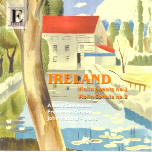For all the lushness and lyric sweep of John Ireland’s romantic idiom, the composer rarely wears his heart on his sleeve. The same can be said for his piano playing. Ireland is at the keyboard in the premiere recordings of his first and second violin sonatas. Of primary interest is the first release of an unpublished 1930 Columbia recording, featuring Albert Sammons in the Second Sonata. Ireland dedicated the work to Sammons, whose centered tone and thorough mastery of the music’s large-scale contours commands respect. As a soloist, Frederick Grinke is not quite in Sammons’ class but he and Ireland display obvious sympathy and rapport in their 1945 recording of the First Sonata. Grinke studied Ireland’s A Minor Phantasie Trio with the composer, adding a modicum of authority to an otherwise routine 1938 recording with pianist Kenneth Taylor and cellist Florence Hooten. The original 78 rpm set’s filler, Holy Boy for piano and cello, puts a gentle button on this important reissue. Michael Dutton’s transfers are seductively lifelike and vibrant.
































